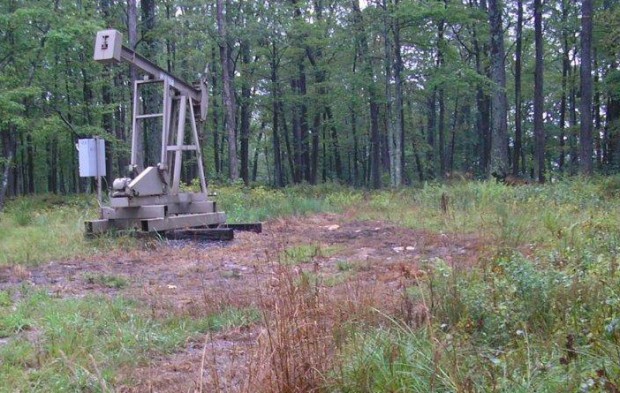House panel approves measure to exempt conventional drillers from new regs
-
Jon Hurdle

Courtesy Pennsylvania DEP
Dead vegetation around a conventional well site in Warren County indicates a possible brine spill. of Environmental Protection
A Pennsylvania House committee on Wednesday approved an amendment that would exempt conventional oil and gas activities from proposed regulations.
The House Environmental Resources and Energy Committee easily passed the amendment to SB 279, which creates a council to advise the Department of Environmental Protection on regulation to distinguish between conventional and unconventional oil and gas development.
The amendment, introduced late Tuesday by Rep. Kathy Rapp (R-Warren) calls for the DEP’s proposed Chapter 78 regulations to be scrapped insofar as they apply to “conventional” oil and gas drilling, which is shallower than the “unconventional” Marcellus Shale development, which combines fracking with horizontal drilling to reach deeper deposits.
“The General Assembly finds and declares that the rulemaking concerning standards at Oil and Gas Well Sites approved by the Environmental Quality Board in 2016 prior to the effective date of this act is abrogated insofar as such regulations pertain to conventional oil and gas wells,” the amendment says.
During a tense hour-long hearing in which Republican advocates for the amendment repeatedly clashed with Democrats defending the regulations, Rapp said it was necessary to create separate regulations for the conventional and unconventional industries.
“It was never the intent of the legislature to include conventional wells with unconventional,” she said.
Rapp said she has “thousands” of conventional oil and gas wells in her district, and argued that Warren County has some of the cleanest water in the state. She accused opponents of the oil and gas industry of being “hypocritical” by criticizing the industry because they are equally dependent on its products as its supporters.
“Every single person sitting here has benefited from the production of conventional wells,” she said.
But Rep. Greg Vitali (D- Delaware), the minority chairman of the committee, said conventional drillers are responsible for at least half of the environmental damage caused by the oil and gas industry, and so should be subject to the same regulations as the unconventional industry.
“Conventional drillers are a big part of the environmental risk that drilling causes in Pennsylvania,” Vitali told the committee.
He said the regulations have been under discussion for four years, and have attracted some 28,000 public comments, most of which are supportive.
He argued that both parts of the industry should be subject to regulations that, for example, would require energy companies to restore water quality if it is impaired by their activities, and ensure that storage facilities are vandal-proof.
“These regs are very important, they are very needed, and we, frankly, should be ashamed of ourselves for allowing these very commonsense regs to protect public health and safety to be abrogated,” he said.
The committee’s approval of the amended bill prompted condemnation by the Clean Power Coalition PA, an alliance of environmental groups that advocates clean energy.
The group, which includes the Sierra Club, PennFuture and the Natural Resources Defense Council, said the bill was part of a package of measures that aims to reduce regulation on Pennsylvania’s energy industry.
One of the other measures, SB 1195 – which would allow the legislature to debate the state’s plans to comply with the federal Clean Power Plan on reducing power-plant emissions – was passed by the Senate on Wednesday, and now goes to the House for consideration.
“SB 1195 and SB 279 represent an unprecedented effort by the Pennsylvania General Assembly to undermine critical environmental, clean energy, and public health protections,” the coalition said in a statement. “By passing these bills, policymakers will set back Pennsylvania’s climate policy by years, gut our state’s overwhelmingly successful energy efficiency program, and stop new regulations on conventional oil and gas drilling.”
Some environmentalists say the administration forced the resignation of former DEP Secretary John Quigley who stepped down in May after only 16 months in office, and who was seen as too friendly to environmental interests.
John Maher, the Republican chairman of the committee, said before the vote that the amendment had been approved by the administration of Gov. Tom Wolf.
Wolf’s spokesman, Jeff Sheridan, declined to say whether the administration approved the amendment.
He issued a statement saying: “The administration can confirm the unconventional oil and gas regulations will be published and we will continue to work with the legislature to reach agreement on the conventional regulations.”
















